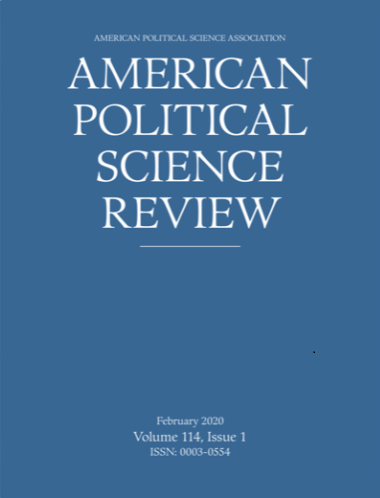邻里劣势对投票行为的长期影响:“向机会移动”实验
IF 5.9
1区 社会学
Q1 POLITICAL SCIENCE
引用次数: 1
摘要
社会经济劣势是政治参与度低的主要原因。这种关联是政治学中最有力的发现之一。然而,它主要基于观测数据。尤其是早期生活不利的因果影响更不为人所知,因为关于随机早期生活反贫困干预的政治后果的长期数据几乎不存在。我们利用“走向机会”(MTO)实验来测试搬出弱势社区——从而摆脱深度贫困——对投票率的长期影响。MTO是美国有史以来最雄心勃勃的反贫困实验之一。尽管MTO长期改善了儿童的贫困状况,但我们发现,与预期相反,干预措施并没有增加儿童以后投票的可能性。额外的测试表明,该项目并没有改善他们的贫困状况,足以影响投票率。这些发现说明了邻里劣势和政治参与度低之间的复杂关系。本文章由计算机程序翻译,如有差异,请以英文原文为准。
The Long-Term Effects of Neighborhood Disadvantage on Voting Behavior: The “Moving to Opportunity” Experiment
Socioeconomic disadvantage is a major correlate of low political participation. This association is among the most robust findings in political science. However, it is based largely on observational data. The causal effects of early-life disadvantage in particular are even less understood, because long-term data on the political consequences of randomized early-life anti-poverty interventions is nearly nonexistent. We leverage the Moving to Opportunity (MTO) experiment to test the long-term effect of moving out of disadvantaged neighborhoods—and thus out of deep poverty—on turnout. MTO is one of the most ambitious anti-poverty experiments ever implemented in the United States. Although MTO ameliorated children’s poverty long term, we find that, contrary to expectations, the intervention did not increase children’s likelihood of voting later in life. Additional tests show the program did not ameliorate their poverty enough to affect turnout. These findings speak to the complex relationship between neighborhood disadvantage and low political participation.
求助全文
通过发布文献求助,成功后即可免费获取论文全文。
去求助
来源期刊

American Political Science Review
POLITICAL SCIENCE-
CiteScore
9.80
自引率
5.90%
发文量
119
期刊介绍:
American Political Science Review is political science''s premier scholarly research journal, providing peer-reviewed articles and review essays from subfields throughout the discipline. Areas covered include political theory, American politics, public policy, public administration, comparative politics, and international relations. APSR has published continuously since 1906. American Political Science Review is sold ONLY as part of a joint subscription with Perspectives on Politics and PS: Political Science & Politics.
 求助内容:
求助内容: 应助结果提醒方式:
应助结果提醒方式:


